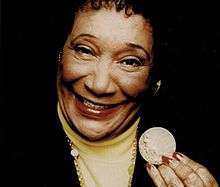Alice Coachman
 | |||||||||||||
| Personal information | |||||||||||||
|---|---|---|---|---|---|---|---|---|---|---|---|---|---|
| Born |
November 9, 1923 Albany, Georgia, United States | ||||||||||||
| Died |
July 14, 2014 (aged 90) Albany, Georgia, United States | ||||||||||||
| Sport | |||||||||||||
| Sport | Athletics | ||||||||||||
Medal record
| |||||||||||||
Alice Marie Coachman (November 9, 1923 – July 14, 2014) was an American athlete. She specialized in high jump and was the first black woman to win an Olympic gold medal.[1]
Biography
Early life and education
Coachman was born on November 9, 1923 in Albany, Georgia. She was the fifth of Fred and Evelyn Coachman's ten children. Raised in the segregated South, Coachman was unable to access athletic training facilities or participate in organised sports because of the colour of her skin.[2] Added to the list of training barriers was her status as a female athlete during a time of widespread opposition to women in sport. She trained using what was available to her running shoeless along the dirtroads near her home and using homemade equipment to practice her jumping.[3]
Coachman attended Monroe Street Elementary School where she was encouraged by her fifth-grade teacher Cora Bailey and from her aunt, Carrie Spry, despite the reservations of her parents. Upon enrolling at Madison High School in 1938 she joined the track team, working with Harry E. Lash to develop her skill as an athlete. Within a year she drew the attenion of the Tuskegee Institute, in Tuskegee, Alabama.[2]
In 1939 she joined the Tuskegee Preparatory School at the age of 16 after being offered a scholarship.[3][4] The scholarship required her to work while studying and training, which included cleaning and maintaining sports facilities as well as mending uniforms.[5]
Coachman went on to graduate with a degree in dressmaking from the Tuskegee Institute in 1946. The following year she continuted her studies at Albany State College, receiving a B.A. in home economics with a minor in 1940 and becoming a teacher.[2][6]
Athletic career
Prior to arriving at the Tuskegee Preparatory School, Coachman competed in the Amateur Athletic Union's (AAU) Women's National Championships breaking the collegiate and National high jump records while competing barefoot.[3] Her unusual jumping style was a combination of straight jumping and western roll techniques.[7]
Coachman dominated the AAU outdoor high jump championship from 1939 through 1948, winning ten national championships in a row.[5] In addition to her high jump accomplishments, she won national championships in the 50-meter dash, the 100-meter dash and with the 400-meter relay team as a student at the Tuskegee Institute. During the same period Coachman won three conference championships playing as a guard on the Tuskegee women's basketball team.[2][7] Despite being in her prime, Coachman was unable to compete in the 1940 and 1944 Olympic Games as they were cancelled because of World War II. In the opinion of sportswriter Eric Williams, "Had she competed in those canceled Olympics, we would probably be talking about her as the No. 1 female athlete of all time."[8]
Coachman's first opportunity to compete on a global stage was during the 1948 Olympic Games in London. She qualified for the US Olympic team with a high jump of 5 feet 4 inches breaking the previous 16-year-old record by ¾ of an inch.[3] In the high jump finals of the 1948 Summer Olympics, Coachman leaped 1.68 m (5 ft 6⅛ in) on her first try. Her nearest rival, Great Britain's Dorothy Tyler, matched Coachman's jump, but only on her second try. Coachman was the only American woman to win an Olympic gold medal in athletics in 1948. Her medal was presented by King George VI.[9]
Upon her return to the United States after the Olympics, Coachman had become a celebrity. Soon after meeting President Harry Truman and former First Lady Eleanor Roosevelt, she was honored with parades from Atlanta to Albany and was thrown a party by Count Basie.[10] In 1952 she became the first African-American woman to endorse an international product when she was signed as a spokesperson by the Coca-Cola Company[6] who featured her prominently on billboards alongside 1936 Olympic winner Jesse Owens.[5] And in her hometown, Alice Avenue and Coachman Elementary School were named in her honor. [11]
Later life
Coachman's athletic career ended when she was 24.[10] She dedicated the rest of her life to education and to the Job Corps.[12]
Coachman died in Albany, Georgia on July 14, 2014 of cardiac arrest after suffering through respiratory problems. She had a stroke a few months prior for which she received treatment from a nursing home. She had two children during her first marriage to N. F. Davis, which ended in divorce. Her second husband, Frank Davis, preceded her in death.[10]
Legacy
During the 1996 Summer Olympic Games in Atlanta, Coachman was honored as one of the 100 greatest Olympians.[4] She was an honorary member of Alpha Kappa Alpha Sorority, inducted in 1998 during the sorority's international conference. In 2002 she was designated a Women's History Month Honoree by the National Women's History Project.[13] Coachman was also inducted to the USA Track and Field Hall of fame in 1975 and the United States Olympic Hall of Fame in 2004.[14]
Coachman has received recognition for opening the door for future African-American track stars such as Evelyn Ashford, Florence Griffith Joyner and Jackie Joyner-Kersee. In fact, in the years since her display of Olympic prowess, black women have made up a majority of the US women's Olympic track and field team. "I think I opened the gate for all of them," she reflected. "Whether they think that or not, they should be grateful to someone in the black race who was able to do these things."[5]
References
- ↑ "Alice Coachman Biography". sports.jrank.org. Archived from the original on 2010-09-27. Retrieved 2010-09-27.
- 1 2 3 4 Ennis, Lisa A. (July 17, 2014). "Alice Coachman (1923-2014)". http://www.georgiaencyclopedia.org/. New Georgia Encyclopedia. Retrieved 2 August 2015. External link in
|website=(help) - 1 2 3 4 "Alice Coachman - First African American Woman Gold Medallist". Olympics 30 - Great Olympic Stories. Retrieved 2 August 2015.
- 1 2 "Alice Coachman Biography Track and Field Athlete (1923–2014)". The Biography.com website. Biography. Retrieved 3 August 2015.
- 1 2 3 4 "Alice Coachman - obituary; Alice Coachman was an American athlete who became the first black woman to win Olympic gold". Telegraph Online. Retrieved 2015-02-24.
- 1 2 Essington, Amy. "Coachman, Alice Marie (1923-2014)". BlackPast.org. Retrieved 3 August 2015.
- 1 2 The Editors of Encyclopædia Britannica (October 24, 2014). "Alice Coachman". Encyclopædia Britannica. Encyclopædia Britannica. Retrieved 2 August 2015.
- ↑ Williams, Eric (2006-04-06). "The Greatest Black Female Athletes Of All-Time". BlackAthlete. Retrieved 2014-07-24.
- ↑ Greenblatt, Alan (2014-07-19). "Why An African-American Sports Pioneer Remains Obscure". Code Switch. NPR. Retrieved 2014-07-24.
- 1 2 3 Goldstein, Richard (July 14, 2014). "Alice Coachman, 90, Dies; First Black Woman to Win Olympic Gold - NYTimes.com". The New York Times. New York: NYTC. ISSN 0362-4331. Retrieved July 15, 2014.
- ↑ "Alice Coachman". Notable Sports Figures, 2004. Retrieved 2015-02-24.
- ↑ "Sports of The Times; Good Things Happening for One Who Decided to Wait". New York Times. Retrieved 2015-02-24.
- ↑ "Honorees: 2010 National Women's History Month". Women's History Month. National Women's History Project. 2010. Retrieved 14 November 2011.
- ↑ "BBC News - US black female gold Olympian Alice Coachman Davis dies". Bbc.com. 1970-01-01. Retrieved 2014-07-15.
Further reading
- "Alice Coachman, 1st Black Woman Gold Medalist, To Be Honored." Jet (July 29, 1996): 53.
- Cummings, D. L. "An Inspirational Jump Into History." Daily News (February 9, 1997): 75.
- Danzig, Allison. "83,000 At Olympics." New York Times (August 8, 1948): S1.
- Deramus, Betty. "Living Legends." Essence (February, 1999): 93.
- "Georgia's Top 100 Athletes of the 1900s." Atlanta Journal-Constitution (December 26, 1999): 4G.
- "Miss Coachman Honored: Tuskegee Woman Gains 3 Places on All-America Track Team." New York Times (January 11, 1946): 24.
- Rhoden, William C. "Sports of the Times; Good Things Happening for the One Who Decided to Wait." New York Times (April 27, 1995): B14.
- Rosen, Karen. "Olympic Weekly; 343 Days; Georgia's Olympic Legacy." Atlanta Journal-Constitution (August 11, 1995): 6D.
- Weiner, Jay. "A Place in History, Not Just a Footnote." Star Tribune (July 29, 1996): 4S.
External links
- Alice Coachman's oral history video excerpts at The National Visionary Leadership Project
